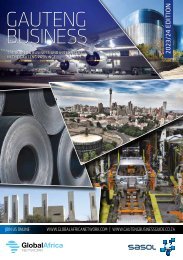Western Cape Business 2017 edition
The 2017 edition of Western Cape Business is the 10th issue of this highly successful publication that, since its launch in 2005, has established itself as the premier business and investment guide to the Western Cape province. The Western Cape has numerous promising investment and business opportunities and this issue includes contributions from Alan Winde (Minister of Economic Opportunities for the Western Cape Government), interviews with Ryan Ravens (CEO of Accelerate Cape Town), Arifa Parkar (Western Cape Business Opportunities Forum CEO), Wesgro CEO Tim Harris and Lance Greyling (Invest Cape Town) as well as contributions from various business leaders. In addition, you will also find comprehensive features on all the key sectors in the Western Cape.
The 2017 edition of Western Cape Business is the 10th issue of this highly successful publication that, since its launch in 2005, has established itself as the premier business and investment guide to the Western Cape province.
The Western Cape has numerous promising investment and business opportunities and this issue includes contributions from Alan Winde (Minister of Economic Opportunities for the Western Cape Government), interviews with Ryan Ravens (CEO of Accelerate Cape Town), Arifa Parkar (Western Cape Business Opportunities Forum CEO), Wesgro CEO Tim Harris and Lance Greyling (Invest Cape Town) as well as contributions from various business leaders. In addition, you will also find comprehensive features on all the key sectors in the Western Cape.
Create successful ePaper yourself
Turn your PDF publications into a flip-book with our unique Google optimized e-Paper software.
Skills development<br />
A number of investors are driving skills development in the province.<br />
The <strong>Western</strong> <strong>Cape</strong> has two problems relating to<br />
employment: not enough work for unskilled<br />
workers, and not enough skilled workers to take<br />
up available jobs. This double-sided challenge<br />
is a legacy of apartheid and it exists throughout<br />
South Africa.<br />
Although the province has higher overall ratios of<br />
highly skilled and skilled workers than the national<br />
averages, less than 20% of the construction industry’s<br />
workforce in the <strong>Western</strong> <strong>Cape</strong> is categorised<br />
as skilled or highly skilled (Quantec, 2013). According<br />
to a national business conditions survey conducted<br />
in early 2016, a skills deficit is hampering the<br />
construction industry.<br />
Construction has been one of the best performing<br />
sectors in the <strong>Western</strong> <strong>Cape</strong> economy for a number<br />
of years, so improvement in this sphere is vital.<br />
The food sector is the other important area where<br />
work has to be done to impart skills to the workforce.<br />
The <strong>Western</strong> <strong>Cape</strong> Provincial Government has<br />
listed skills development as one of four key “enablers”<br />
of the regional economy. A specific intervention<br />
relevant to the construction industry is offered by<br />
the provincial Department of Transport and Public<br />
Works. Targeted training for emerging contractors<br />
is presented in regional centres like Riversdale and<br />
Worcester, and in Piketberg and Saldanha. The fourweek,<br />
modular course, which covers issues such as<br />
site management, safety and enterprise development,<br />
allows contractors to continue running their<br />
businesses while they study. The course supports<br />
the Expanded Public Works Programme (EPWP).<br />
Another provincial initiative was launched in<br />
October 2016: the <strong>Western</strong> <strong>Cape</strong>’s Apprenticeship<br />
Game Changer. Announced at the annual meeting<br />
of the Premier’s Council on Skills, the Game Changer<br />
aims to introduce 32 500 qualified apprentices into<br />
the labour market by 2019. R1-billion has been allocated<br />
over a three-year time frame. <strong>Business</strong>es<br />
have been asked to identify the specific skills they<br />
need, so for example the oil and gas sector needs<br />
welders certified to a certain level.<br />
A range of interventions at national and regional<br />
level have been launched to tackle the problem in<br />
the public and private sphere:<br />
• Six of South Africa’s biggest construction<br />
companies have established a R1.25-billion<br />
skills fund<br />
WESTERN CAPE BUSINESS <strong>2017</strong><br />
62


















